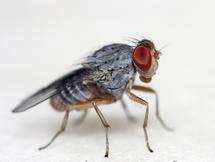Why do fruit flies live so long?

Queen's University professor Adam Chippindale (Biology) and PhD candidate Christopher Kimber appear to have revealed an anomaly in the evolutionary theory of aging.
Their work has shown surprising stability of post-reproductive life span in the fruit fly, Drosophila melanogaster, a major model system in genetics.
"After analyzing 30 years of data for fruit flies in the lab, we have found no evidence for deterioration of the life span despite relentless selection for what should be a live fast, die young strategy," says Dr. Chippindale. "We were surprised not to see a decline in longevity due to constant pressure to breed early, or the accumulation of mutations that cause harm late in life; these are the forces that shape ageing evolutionarily."
To test the idea, Mr. Kimber and Dr. Chippindale experimentally allowed mutations with early life impact to build up. Such mutations would normally be eliminated by natural selection because of reduced reproductive success of the flies carrying the mutations. Their research demonstrates that maintaining healthy genes early in life promotes extended survival. This explains why longevity is sustained long after the fruit flies breed.
"This research adds a new force to the evolutionary theory that will help us understand what shapes the life span of all organisms," says Dr. Chippindale. "We now understand why selection has not made the fruit fly into a salmon."
The research appears in the most recent issue of Current Biology.
More information: download.cell.com/current-biol … 0960982213011962.pdf
Journal information: Current Biology
Provided by Queen's University

















